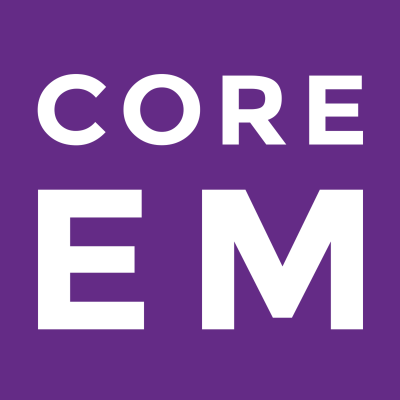
Core EM - Emergency Medicine Podcast
Podcast de Core EM
Disfruta 30 días gratis
4,99 € / mes después de la prueba.Cancela cuando quieras.

Más de 1 millón de oyentes
Podimo te va a encantar, y no sólo a ti
Valorado con 4,7 en la App Store
Acerca de Core EM - Emergency Medicine Podcast
Core EM Emergency Medicine Podcast
Todos los episodios
225 episodios[https://coreem.net/content/uploads/2025/08/Angioedema.001.jpeg] https://coreem.net/podcast/episode-212-angioedema/ Angioedema – Recognition and Management in the ED Hosts: Maria Mulligan-Buckmiller, MD Brian Gilberti, MD https://media.blubrry.com/coreem/content.blubrry.com/coreem/Angioedema.mp3 [https://media.blubrry.com/coreem/content.blubrry.com/coreem/Angioedema.mp3] Download [https://media.blubrry.com/coreem/content.blubrry.com/coreem/Angioedema.mp3] Leave a Comment [https://coreem.net/podcast/episode-212-angioedema/#comments] Tags: Airway [https://coreem.net/tag/airway/] SHOW NOTES DEFINITION & PATHOPHYSIOLOGY Angioedema = localized swelling of mucous membranes and subcutaneous tissues due to increased vascular permeability. Triggers increased vascular permeability → fluid shifts into tissues. ---------------------------------------- ETIOLOGIES * Histamine-mediated (anaphylaxis) * Associated with urticaria/hives, pruritus, and redness. * Triggered by allergens (foods, insect stings, medications). * Rapid onset (minutes to hours). * Bradykinin-mediated * Hereditary angioedema (HAE): C1 esterase inhibitor deficiency (autosomal dominant). * Acquired angioedema: Associated with B-cell lymphoma, autoimmune disease, MGUS. * Medication-induced: Most commonly ACE inhibitors; rarely ARBs. * Typically lacks urticaria and itching. * Gradual onset, can last days if untreated. * Idiopathic angioedema * Unknown cause; diagnosis of exclusion. ---------------------------------------- CLINICAL PRESENTATIONS * Swelling * Asymmetric, non-pitting, usually non-painful. * May involve lips, tongue, face, extremities, GI tract. * Respiratory compromise * Upper airway swelling → stridor, dyspnea, sensation of throat closure. * Airway obstruction is the most feared complication. * Abdominal manifestations * Bowel wall angioedema can mimic acute abdomen: * Nausea, vomiting, diarrhea, severe pain, increased intra-abdominal pressure, possible ischemia. ---------------------------------------- KEY DIFFERENTIATING FEATURES * Histamine-mediated: rapid onset, hives/itching, resolves quickly with epinephrine, antihistamines, and steroids. * Bradykinin-mediated: slower onset, lacks urticaria, prolonged duration, less responsive to standard anaphylaxis medications. ---------------------------------------- DIAGNOSTIC APPROACH IN THE ED * Focus on airway (ABCs) and clinical assessment. * Labs (e.g., C4 level) useful for downstream diagnosis (esp. HAE) but not for acute management. * Imaging: only if symptoms suggest abdominal involvement or to rule out other causes. ---------------------------------------- TREATMENT STRATEGIES * Airway protection is always priority: * Early consideration of intubation if worsening obstruction or inability to manage secretions. * Histamine-mediated (anaphylaxis): * Epinephrine (IM), antihistamines, corticosteroids. * Bradykinin-mediated: * Epinephrine may be tried if unclear etiology (no significant harm, lifesaving if histamine-mediated). * Targeted therapies: * Icatibant: bradykinin receptor antagonist. * Ecallantide: kallikrein inhibitor (less available). * C1 esterase inhibitor concentrate: replenishes deficient protein. * Fresh frozen plasma (FFP): contains C1 esterase inhibitor. * Tranexamic acid (TXA): off-label, less evidence, considered if no other options. ---------------------------------------- COMPLICATIONS TO WATCH FOR * Airway compromise: rapid deterioration possible. * Abdominal compartment syndrome from bowel edema (rare, surgical emergency). ---------------------------------------- TAKE-HOME POINTS * Secure the airway if in doubt. * Differentiate histamine-mediated vs bradykinin-mediated by presence/absence of hives/itching and speed of onset. * Use epinephrine promptly if suspecting histamine-mediated angioedema or if uncertain. * Consider bradykinin-targeted therapies for confirmed hereditary, acquired, or ACE-inhibitor–related angioedema. * Recognize ACE inhibitors as the most frequent medication trigger; ARBs rarely cause it. * Labs and imaging generally don’t change initial ED management but aid diagnosis for follow-up care. Read More [https://coreem.net/podcast/episode-212-angioedema/]
[https://coreem.net/content/uploads/2025/07/Granulomatosis-with-Polyangiitis.001.jpeg] https://coreem.net/podcast/episode-211-granulomatosis-with-polyangiitis/ Granulomatosis with Polyangiitis (GPA) – Recognition and Management in the ED Hosts: Phoebe Draper, MD Brian Gilberti, MD https://media.blubrry.com/coreem/content.blubrry.com/coreem/GPA.mp3 [https://media.blubrry.com/coreem/content.blubrry.com/coreem/GPA.mp3] Download [https://media.blubrry.com/coreem/content.blubrry.com/coreem/GPA.mp3] One Comment [https://coreem.net/podcast/episode-211-granulomatosis-with-polyangiitis/#comments] Tags: Rheumatology [https://coreem.net/tag/rheumatology/] SHOW NOTES BACKGROUND * A vasculitis affecting small blood vessels causing inflammation and necrosis * Affects upper respiratory tract (sinusitis, otitis media, saddle nose deformity), lungs (nodules, alveolar hemorrhage), and kidneys (rapidly progressive glomerulonephritis) * Can lead to multi-organ failure, pulmonary hemorrhage, renal failure RED FLAG SYMPTOMS: * Chronic sinus symptoms * Hemoptysis (especially bright red blood) * New pulmonary complaints * Renal dysfunction * Constitutional symptoms (fatigue, weight loss, fever) WORKUP IN THE ED: * CBC, CMP for anemia and AKI * Urinalysis with microscopy (hematuria, RBC casts) * Chest imaging (CXR or CT for nodules, cavitary lesions) * ANCA testing (not immediately available but important diagnostically) MANAGEMENT: * Stable patients: Outpatient workup, urgent rheumatology consult, prednisone 1 mg/kg/day * Unstable patients: High-dose IV steroids (methylprednisolone 1 g daily x3 days), consider plasma exchange, cyclophosphamide or rituximab initiation, ICU admission CONDITIONS THAT MIMIC GPA: * Goodpasture syndrome (anti-GBM antibodies) * TB, fungal infections * Lung malignancy * Other vasculitides (EGPA, MPA, lupus) ANCA TESTING UTILITY: * C-ANCA/PR3-ANCA positive in 80-90% of GPA cases * P-ANCA/MPO-ANCA more common in MPA * Don’t delay treatment while awaiting results if suspicion is high OUTCOMES: * Without treatment: Fatal within a year (renal failure, respiratory complications) * With treatment: 5-year survival ~75-90%, but ~50% relapse rate * Long-term rheumatology follow-up is essential TAKE-HOME POINTS: * Always include vasculitis in the differential for unexplained respiratory, renal, or systemic symptoms. * Recognize pulmonary-renal syndromes early. * Initiate high-dose steroids immediately for unstable patients without waiting for ANCA results. * GPA is rare but life-threatening – early recognition saves lives. Read More [https://coreem.net/podcast/episode-211-granulomatosis-with-polyangiitis/]
[https://coreem.net/content/uploads/2025/06/Capacity-Assessment.001.jpeg] https://coreem.net/podcast/episode-210-capacity-assessment/ We discuss capacity assessment, patient autonomy, safety, and documentation. Hosts: Anne Levine, MD Brian Gilberti, MD https://media.blubrry.com/coreem/content.blubrry.com/coreem/Capacity_Assessment.mp3 [https://media.blubrry.com/coreem/content.blubrry.com/coreem/Capacity_Assessment.mp3] Download [https://media.blubrry.com/coreem/content.blubrry.com/coreem/Capacity_Assessment.mp3] One Comment [https://coreem.net/podcast/episode-210-capacity-assessment/#comments] SHOW NOTES THE IMPORTANCE OF CAPACITY ASSESSMENT * Arises frequently in the ED, even when not formally recognized * Carries both legal implications and ethical weight * Failure to appropriately assess capacity can result in: * Forced treatment without justification * Missed opportunities to respect autonomy * Increased risk of litigation and poor patient outcomes DEFINING CAPACITY * Capacity is: * Decision-specific: varies based on the medical choice at hand * Time-specific: can fluctuate due to medical conditions, intoxication, delirium * Distinct from competency, which is a legal determination * Relies on a patient’s ability to: * Understand relevant information * Appreciate the consequences * Reason through options * Communicate a clear choice REAL-WORLD ED EXAMPLES * Intoxicated patient with head trauma refusing CT * Unreliable neuro exam * Potentially time-sensitive intracranial injury * Elderly patient with sepsis refusing admission due to caregiving responsibilities * Balancing autonomy vs. beneficence * Patient with gangrenous diabetic foot refusing surgery * Demonstrates logic and consistency despite high-risk decision THE 4 PILLARS OF CAPACITY ASSESSMENT * Understanding * Can the patient explain: * Their condition * Recommended treatments * Risks and benefits * Alternatives and outcomes? * Sample prompts: * “What are the options for your situation?” * “What might happen if we do nothing?” * Appreciation * Does the patient grasp the personal relevance of the information? * Sample prompts: * “Why do you think we’re recommending this?” * “How do you think this condition could affect you?” * Reasoning * Can the patient logically explain their choice? * Must demonstrate a rational process, even if the outcome seems unwise * Sample prompts: * “What factors are you considering in making this decision?” * “What led you to this conclusion?” * Choice * Is the patient able to clearly communicate a decision? * Any modality acceptable: verbal, written, gestural * Sample prompts: * “We’ve discussed several options. What do you want to do?” * “Have you decided what option is best for you?” COMMON ED CHALLENGES & SOLUTIONS Time Pressure * Capacity assessments can be time-consuming * Yet, patients leaving AMA without proper evaluation are at higher risk: * ↑ 30-day mortality * ↑ 30-day readmission Communication Barriers * Language differences → use certified interpreters * Cognitive impairment or psych illness → clarify baseline status * Noisy ED environment → relocate to quiet space * Use simple language, avoid jargon Ethical Dilemmas * Providers may disagree with patient choices * Ensure decision-making process—not the choice itself—is being judged * Use tools like the Aid to Capacity Evaluation (ACE) * When uncertain, consult Psychiatry or Risk Management BEST PRACTICES IN DOCUMENTATION Clearly document: * The patient’s understanding, appreciation, reasoning, and choice * Information delivered: * Condition * Treatment recommendations * Alternatives and risks * Patient’s responses and logic * Witnesses to the conversation * Any discharge instructions, including: * Follow-up plans * Prescriptions provided * Return precautions Also document: * If patient refused treatment, document: * That risks and benefits were clearly explained * That refusal was voluntary * If treatment was administered despite objection: * Document rationale for presumed lack of capacity * Legal/ethical justification for action * Involvement of other services (e.g., Psychiatry, Risk) Read More [https://coreem.net/podcast/episode-210-capacity-assessment/]
[https://coreem.net/content/uploads/2025/04/Blast-Crisis.001.jpeg] https://coreem.net/podcast/episode-209-blast-crisis/ We dive into the recognition and management of blast crisis. Hosts: Sadakat Chowdhury, MD Brian Gilberti, MD https://media.blubrry.com/coreem/content.blubrry.com/coreem/Blast_Crisis.mp3 [https://media.blubrry.com/coreem/content.blubrry.com/coreem/Blast_Crisis.mp3] Download [https://media.blubrry.com/coreem/content.blubrry.com/coreem/Blast_Crisis.mp3] 2 Comments [https://coreem.net/podcast/episode-209-blast-crisis/#comments] Tags: Hematology [https://coreem.net/tag/hematology/], Oncology [https://coreem.net/tag/oncology/] SHOW NOTES TOPIC OVERVIEW * Blast crisis is an oncologic emergency, most commonly seen in chronic myeloid leukemia (CML). * Defined by: * >20% blasts in peripheral blood or bone marrow. * May include extramedullary blast proliferation. * Without treatment, median survival is only 3–6 months. PATHOPHYSIOLOGY & ASSOCIATED CONDITIONS * Usually occurs in CML, but also in: * Myeloproliferative neoplasms (MPNs) * Myelodysplastic syndromes (MDS) * Transition from chronic to blast phase often reflects disease progression or treatment resistance. RISK FACTORS * 10% of CML patients progress to blast crisis. * Risk increased in: * Patients refractory to tyrosine kinase inhibitors (e.g., imatinib). * Those with Philadelphia chromosome abnormalities. * WBC >100,000, which increases risk for leukostasis. CLINICAL PRESENTATION * Symptoms often stem from pancytopenia and leukostasis: * Anemia: fatigue, malaise. * Functional neutropenia: high WBC count, but increased infection/sepsis risk. * Thrombocytopenia: bleeding, bruising. * Leukostasis/hyperviscosity effects by system: * Neurologic: confusion, visual changes, stroke-like symptoms. * Cardiopulmonary: ARDS, myocardial injury. * Others: priapism, limb ischemia, bowel infarction. * Rapid deterioration is common — early recognition is critical. DIAGNOSTIC WORKUP * CBC with differential: assess blast % and cytopenias. * Peripheral smear and manual diff: confirm immature blasts. * CMP: screen for tumor lysis syndrome: * Elevated potassium, phosphate, uric acid. * Low calcium. * LDH & uric acid: markers of high cell turnover. * Coagulation studies (PT, PTT): assess for DIC. * Definitive tests (done inpatient): bone marrow biopsy, flow cytometry. EMERGENCY DEPARTMENT MANAGEMENT * Resuscitation & ABCs: oxygen, IV fluids, vitals monitoring. * Avoid aggressive transfusions: * Risk of hyperviscosity with PRBCs and platelets. * Initiate broad-spectrum antibiotics early: * High suspicion for sepsis in functionally neutropenic patients. * Consider antifungals for prolonged febrile neutropenia. * Cytoreduction strategies: * Hydroxyurea to lower WBCs quickly. * Tyrosine kinase inhibitors (TKIs). * High-dose chemotherapy. * Early consultation with hematology/oncology is essential. * Mutation testing may guide targeted therapy. PROGNOSIS * Without treatment: median survival ~3 months. * With treatment: * Potential survival >1 year. * Best outcomes in patients who enter a second chronic phase and undergo allogeneic stem cell transplant. ETHICAL & LOGISTICAL CONSIDERATIONS * Treatment may involve aggressive interventions with serious side effects. * Important to assess: * Patient goals of care. * Capacity for informed consent. * Resource limitations: * Not all hospitals have oncology services. * Patients may require transfer over long distances. * Emphasize early, transparent discussions with patients and families. TOP 3 TAKE-HOME POINTS * Recognize early: Look for cytopenias, leukostasis, and rapid clinical decline. * Resuscitate appropriately: Start antibiotics; be cautious with transfusions. * Call for help: Early hematology/oncology involvement is essential for definitive care. Read More [https://coreem.net/podcast/episode-209-blast-crisis/]
[https://coreem.net/content/uploads/2025/04/Geriatric-Emergency-Medicine.001.jpeg] https://coreem.net/podcast/episode-208-geriatric-emergency-medicine/ We explore the expanding field of Geriatric Emergency Medicine. Hosts: Ula Hwang, MD Brian Gilberti, MD https://media.blubrry.com/coreem/content.blubrry.com/coreem/Geriatric_Emergency_Medicine.mp3 [https://media.blubrry.com/coreem/content.blubrry.com/coreem/Geriatric_Emergency_Medicine.mp3] Download [https://media.blubrry.com/coreem/content.blubrry.com/coreem/Geriatric_Emergency_Medicine.mp3] One Comment [https://coreem.net/podcast/episode-208-geriatric-emergency-medicine/#comments] Tags: Geriatric [https://coreem.net/tag/geriatric/] SHOW NOTES KEY TOPICS DISCUSSED * Importance and impact of geriatric emergency departments. * Optimizing care strategies for geriatric patients in ED settings. * Practical approaches for non-geriatric-specific EDs. CHALLENGES IN GERIATRIC EMERGENCY CARE * Geriatric patients often present with: * Multiple chronic conditions * Polypharmacy * Functional decline (mobility issues, cognitive impairments, social isolation) ADAPTING CLINICAL APPROACH * Core objective remains acute issue diagnosis and treatment. * Additional considerations for geriatric patients: * Review and caution with medications to prevent adverse reactions. * Address functional limitations and cognitive impairments. * Emphasize safe discharge and care transitions to prevent unnecessary hospitalization. IDENTIFYING HIGH-RISK GERIATRIC PATIENTS * Screening tools: * Identification of Seniors at Risk (ISAR) * Frailty screens * Alignment with the “Age-Friendly Health Systems” initiative focusing on: * Mentation * Mobility * Medications * Patient preferences (what matters most) * Mistreatment (elder abuse awareness) MINIMIZING HOSPITAL-RELATED HARMS * Involvement of multidisciplinary teams: * Social workers and care managers for care transitions * Geriatric-certified pharmacists for medication review * Coordination with outpatient services post-discharge IMPLEMENTING GERIATRIC CARE IN ALL EDS * Basic geriatric care achievable even in resource-limited or rural EDs. * Level 3 Geriatric ED Accreditation can be achieved through: * Improved care transitions * Staff education enhancements * Age-friendly environments (comfort, nutrition, hydration) FUTURE OF GERIATRIC EMERGENCY MEDICINE * Vision: Universal integration of geriatric-focused care. * Goals: * Enhanced patient experience * Improved care transitions * Alignment of treatments with patient goals * Broader enhancement of emergency care quality for all patient populations Read More [https://coreem.net/podcast/episode-208-geriatric-emergency-medicine/]

Valorado con 4,7 en la App Store
Disfruta 30 días gratis
4,99 € / mes después de la prueba.Cancela cuando quieras.
Podcasts exclusivos
Sin anuncios
Podcast gratuitos
Audiolibros
20 horas / mes

































